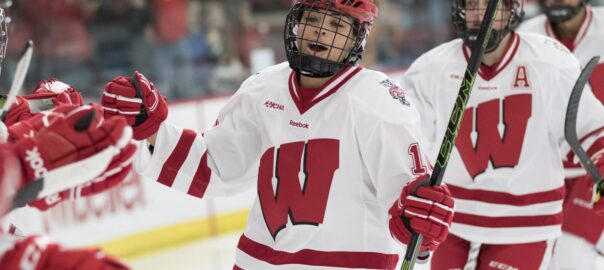How the UW-Madison women’s ice hockey team will have to improve next season to keep up with top-conference competitors Minnesota and Ohio State


The Badgers started off the 2021-2022 season strong as they won their first 15 calendar games bringing the team to a 15-0-1 winning streak before losing to the University of Minnesota on Dec. 3. Following their first loss, the team took a deep dive and fell to an 8-7-2 record and was continually swept by top-conference competitors Minnesota, Ohio State, and occasionally Minnesota-Duluth for much of the remainder of the season. For the team to fare better against these top competitors and to have a chance at reclaiming their national championship title this upcoming season there are several things that will need to happen.
A reoccurring issue this season was that the Badgers were incredibly slow to pick a game speed, sometimes waiting all the way into the second period. They also tended to rely more on their opponents to establish the game speed rather than their starters leading to increased opponent comfortability and a more frenzied defense left to pick up the pace. The Badgers need to be less reliant on competitors and meet the program’s reputation as fast and forceful offense as it has been in past years. If the offense can pick up the slack, they will be able to force mistakes on opponents and get into the net quicker.
Another problem was poor offensive line connectivity where players were unable to make the fast and strong connections required of a top-tier team. This might come as a challenge in the upcoming season as the team is losing several big-name forwards which could potentially be offset by a promising recruiting class. This includes Delaney Drake, Brette Pettet, Maddie
Posick, Caitlin Schneider, and Daryl Watts. Furthermore, the team needs to improve on both ends, as the defense was weak in protecting the blue line where top competitors often broke through into the shooting zone without much difficulty. If the defense can provide consistent protection inside the blue line, it will put Wisconsin in peril less often and even out shooting potential between competitors.
There are several returning upperclassmen who ended up only capitalizing on their full capabilities sporadically throughout the season, making game predictions, especially those with the “big dogs”, hard to predict. These players include forwards Casey O’Brien, Makenna Webster, Sophie Shirley and Sarah Wozniewicz, and defenseman Nicole LaMantia. If these players can get comfortable being in leadership roles and consistently perform the team could have substantial improvements in overall game performance.
Then there are schedule challenges, as most collegiate hockey games are played in two-game series, and I do not anticipate that changing into the next season. To stand out among other competitors Wisconsin needs to be able to bounce back from losses and reset from wins quickly with a carryover period of 24 hours or less during these two-day game series. If the team can, under losing conditions, recognize their mistakes and find solutions under time pressures, and through winning conditions do a full mental reset to not approach a second-day game groggy and exposed I believe we could give Minnesota and Ohio State a run for the title.
This season had some unique aspects as the 2022 Beijing Games ran midway through the season which I believe impacted the team more negatively. First off, the team lost members and recruits for centralization in the Olympics which lessened the potential of the season’s roster. Secondly, there were several Wisconsin alumni on both the U.S. and Canada teams which was exciting because they pulled away from the competition and won silver and gold respectively.
However, the attention shifted away from Wisconsin and was centered on the Olympic impacting the team’s morale which can be seen statistically starting in late December and following all the way through to the end of the season. Looking forward on a more positive note, Wisconsin will be getting players back from Olympic leave this upcoming season, but it remains uncertain whether these returning players will live up to the hype and be able to transfer their Olympics experience to a collegiate level.